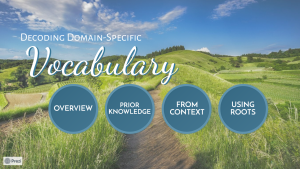33 Domain-Specific Vocabulary
Learning Objectives
-
Practice strategies for learning domain-specific vocabulary for Science and Social Studies texts.
-
Cite specific textual evidence to support inferences and conclusions drawn from the text.
Chapter & Discussion
This chapter includes a presentation that can be navigated in a classroom setting or independently. You can access the presentation via the link below.
Science & Social Studies: Domain-Specific Vocabulary
Work through the different sections of the chapter and discuss ideas and topics as they arise. If you’re working independently, take notes instead. Notes and active discussion will be helpful in navigating this week’s assignments.
Overview
One of the challenges of Reading for Information, especially in science and social studies texts, is tackling domain-specific vocabulary.
Reading for Information texts are almost always specific to a field of study. That means that they will include vocabulary from that domain. We’ll study a few skills to deal with this.
First, we’ll practice vocabulary from the domains that matter most: science and social studies. Next, we’ll practice some strategies for figuring out what these terms mean from the context. Usually, these writers try to explain these terms as they go.
We’ll also practice how to decode new fords from their Greek and Latin roots.
Prior Knowledge
Most reading comprehension is built on prior knowledge in some way. This fact can help us to learn new words by anchoring our understanding on things we already know.
Research shows prerequisite vocabulary accelerates content area learning more than any other pre-reading activity. It prevents learning gaps.
So spending time upfront building a “base” vocabulary for science and social studies better equips learners to grasp specialized texts when it’s time to dive into the content area. It streamlines upcoming vocabulary acquisition.

From Context
Learning vocabulary from context is an important skill and reading comprehension strategy. Here are some key reasons why:
- Many new words are learned from context rather than direct instruction.
- Deciphering meaning from context clues allows readers to determine a word’s overall sense and usage without stopping to look it up. This supports fluency.
- Research shows that grasping vocabulary from context is better reinforced in memory over time than straight vocabulary drills.
- Our brains more effectively retain words learned in meaningful contexts.
Using Roots
Practicing Greek and Latin roots can be tremendously helpful when tackling domain-specific vocabulary, especially in subject areas like science and social studies. Here’s why:
Many complex terminology words used across various academic domains are derived from Latin and Greek origins. Recognizing these roots can give you clues to a word’s overall meaning.
Learning common Greek and Latin prefixes, suffixes, and root words equips you with the keys for deciphering unfamiliar words by breaking them down into word parts. It’s like recognizing helpful clues.

Assigned Reading
Here are this week’s readings. Additionally, please read for your own personal enjoyment for 1/2 hour each day. This will be called your “Reading Zone” reading and it will coincide with many upcoming activities.
The Educator’s Science of Reading Toolbox (via the National Center on Improving Literacy)
Assignment: Vocabulary- Building on Prior Knowledge
The goal of this assignment is to figure out which science/social studies concepts are already prior knowledge, and which ones you might want to study.
For the following terms, write a brief definition from memory. If you can’t remember, take a guess. Mark your guesses in bold.
Science Vocab
Atom
Cell
Chemical
Electricity
Energy
Experiment
Gravity
Hypothesize
Mass
Matter
Measure
Organism
Procedure
Properties
Quantity
React
Temperature
Theorem
Variable
Volume
Social Studies Vocab
Agriculture
Capital
Citizen
Civilization
Culture
Economic
Educate
Expand
Explore
Geography
Goods
Government
History
Industry
Invent
Migration
Politician
Population
Region
Religion
Resources
Services
Transportation
Urban
Assignment: Vocabulary- Roots
The following are Greek and Latin roots (and their meanings) that are common in science and social studies concepts. For each root, list a word that uses it. Make sure it’s a word you know.
Science Roots
Aero- (Greek) – air, aerial
Amphi- (Greek) – both, on both sides
Bio- (Greek) – life, biological
Chrono- (Greek) – time, chronology
Cosmo- (Greek) – order, universe
Crypto- (Greek) – hidden, secret
Geo- (Greek) – earth, geology
Helio- (Greek) – sun
Hydro- (Greek) – water, liquid
Micro- (Greek) – small, microscope
Morph- (Greek) – shape, form
Meter- (Greek) – measure, measurement
Multi- (Latin) – many, multiple
Omni- (Latin) – all
Psych- (Greek) – mind, psychology
Quant- (Latin) – quantity
Sym- or syn- (Greek) – together, same
Tele- (Greek) – distant, telescope
Uni- (Latin) – one
Social Studies Roots
Agricult- (Latin) – field, farming
Anthro- (Greek) – human, anthropology
Arch- (Greek) – chief, principal
Civ- or civil- (Latin) – citizen, civilized
Eco- (Greek) – home, ecology
-graphy (Greek) – writing, photographs
Homo- (Latin) – same, homosexuality
Histor- (Greek) – history
-ism (Greek) – practice of, feminism
-logy (Greek) – study of, sociology
Misc- (Latin) – mix, miscellaneous
Myth- (Greek) – myth
Nov- or novo- (Latin) – new, innovate
Polit- (Latin) – politics, politician
Popul- or populi (Latin) – population, people


